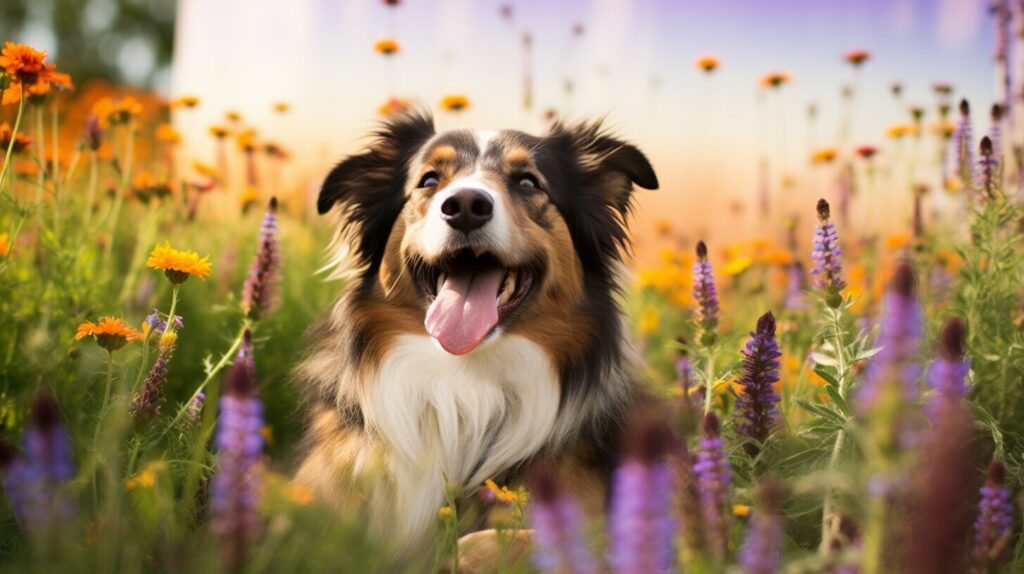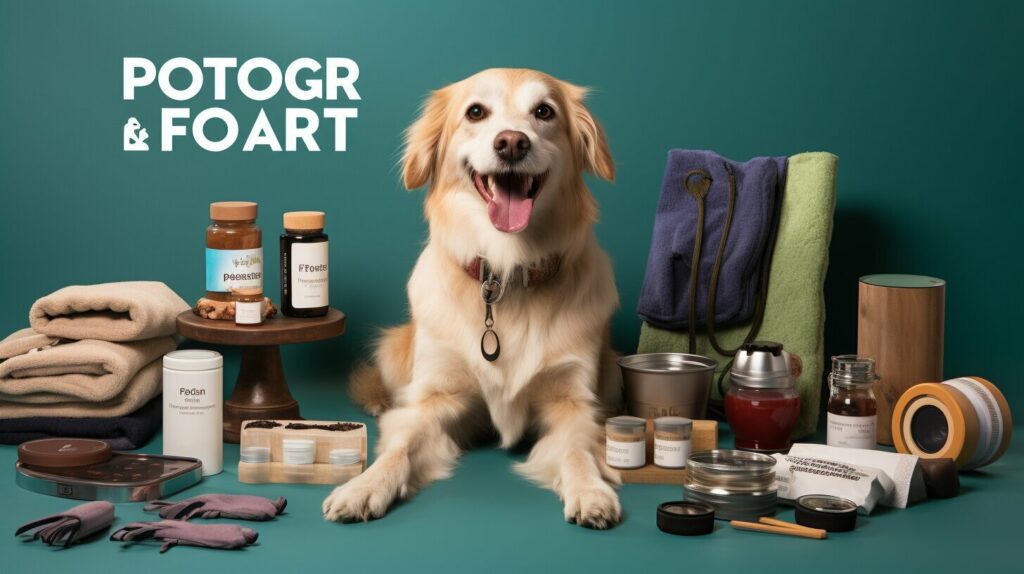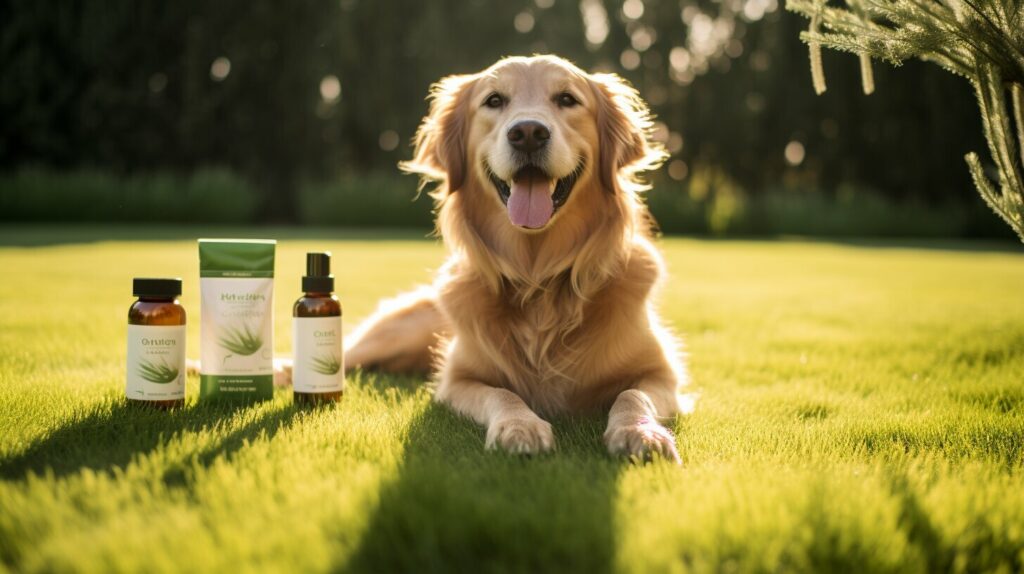As a dog owner, you want nothing but the best for your furry friend. Essential oils can be a great addition to your dog’s health and wellness routine, but it’s important to use oils that are safe for them.
In this detailed guide, you’ll learn all about essential oils that are safe for dogs and how to use them to promote their wellbeing. From energizing and uplifting oils to calming and relaxing ones, we’ll cover it all. You’ll also learn about potential benefits such as promoting healthy skin and coat, supporting joint and muscle health, and freshening breath and improving oral hygiene.
Key Takeaways:
- Using essential oils can benefit your dog’s health and wellness.
- It’s important to use oils that are safe for dogs.
- In this guide, you’ll learn how to use essential oils to promote your dog’s wellbeing.
Understanding Essential Oils and Their Benefits for Dogs
Essential oils are highly concentrated liquids extracted from plants that contain natural compounds with various therapeutic properties. They have been used for centuries as natural remedies for a wide range of health issues.
Essential oils can also benefit dogs in many ways. They can help promote physical and emotional wellbeing, support a healthy immune system, and aid in the treatment of certain health conditions.
When used correctly, essential oils can be an effective and safe alternative to traditional medications. However, it is important to understand the proper use and dosage for dogs, as well as which oils are safe and which should be avoided.
Some essential oils can be toxic to dogs, especially when used in high concentrations or without proper dilution. It is crucial to choose high-quality oils that are safe and suitable for canine use.
Some of the most popular essential oils for dog health include lavender, peppermint, chamomile, frankincense, and eucalyptus. Each oil has its unique properties and potential benefits for dogs, ranging from calming and relaxing effects to pain relief and immune system support.
Essential oils can be administered to dogs through various methods, including topical application, diffusing, and ingestion. It is important to follow proper guidelines and dosage recommendations to ensure the safety and effectiveness of these methods.
Overall, essential oils can be a valuable addition to your dog’s wellness routine when used correctly and safely. Consult with your veterinarian and do your research before incorporating essential oils into your dog’s care regimen.
Ensuring Safe Use of Essential Oils for Dogs
As a responsible pet owner, it’s crucial to select safe essential oils for your furry friend to avoid any potential harm or discomfort. Not all essential oils are safe for dogs, so it’s important to choose pet-safe and dog-safe essential oils that won’t cause any adverse reactions.
When selecting essential oils for your dog, quality and purity are key factors to consider. Poor quality oils may contain harmful chemicals or contaminants, while pure and high-quality oils offer the safest and most beneficial results.
Before using any essential oil on your dog, it’s important to dilute it properly. Most essential oils should be diluted with a carrier oil, such as coconut or olive oil, to avoid any skin irritation or other reactions. A suitable dilution ratio is one to two drops of essential oil per ounce of carrier oil.
It’s also important to use essential oils in moderation and to observe your dog’s behavior and reaction to the oil. Too much of an oil or improper usage can lead to adverse effects, including breathing problems, nausea, or allergic reactions.
Lastly, always consult with your veterinarian before using any new essential oils on your dog. Your vet can provide advice on which oils are safe for your dog and how to properly use them for maximum benefits.
Essential Oils to Energize and Uplift Your Dog
Essential oils can be a great way to energize and uplift your dog. Here are some safe and dog-friendly essential oils that you can try:
| Essential Oil | Potential Benefits |
|---|---|
| Petitgrain | Relieves anxiety, boosts mood |
| Lemongrass | Energizes, relieves stress |
| Basil | Boosts mood, improves mental alertness |
When using essential oils to energize and uplift your dog, always remember to use them safely. Dilute the oils properly and avoid using them on sensitive areas such as the nose and eyes. When using a diffuser, make sure your dog has the option to leave the room if they wish.
With the right essential oils and proper usage, you can help your dog feel more energetic and joyful. However, it’s important to keep in mind that every dog is different. If you notice any adverse reactions to an essential oil, discontinue use and consult your veterinarian.
Essential Oils for Calming and Relaxing Your Dog
If your dog struggles with anxiety or nervousness, certain essential oils can provide a natural solution to help them feel more relaxed and calm. Here are some of the best essential oils that are safe for dogs and have a calming effect:
- Lavender: This classic essential oil is known for its soothing properties and can help promote relaxation in dogs. It can be used in a diffuser or diluted with a carrier oil for topical application.
- Chamomile: Chamomile is another gentle essential oil that can help calm dogs. It has anti-inflammatory properties and can be added to a dog’s shampoo or diluted for use as a massage oil.
- Bergamot: Bergamot essential oil has a citrusy scent that can help uplift your dog’s mood and reduce stress. It can be diffused or diluted for topical use.
When using essential oils for your dog’s wellbeing, it’s important to dilute them properly and use a quality, pet-safe product. Always consult with your veterinarian before introducing new essential oils to your pup’s routine.
Essential Oils for Soothing Your Dog’s Skin and Coat
If your dog suffers from itchy skin or a dull coat, essential oils can provide a natural and effective solution. However, it’s important to choose dog-safe essential oils that won’t harm your furry friend. Here are some essential oils that are safe for dogs and can help soothe their skin and improve their coat:
| Essential Oil | Benefits |
|---|---|
| Lavender | Calming and soothing for irritated skin. Helps with hot spots and skin allergies. Can also repel fleas and ticks. |
| Chamomile | Anti-inflammatory and calming. Can help with skin irritations and soothe itchy skin. Also promotes coat shine. |
| Tea Tree | Antibacterial and antifungal properties. Can address skin infections and help prevent fleas and ticks. |
| Cedarwood | Anti-inflammatory and antiseptic. Can help with dandruff and eczema. Can also repel fleas and ticks. |
When using essential oils for your dog’s skin and coat, it’s important to dilute them properly. Use a carrier oil such as coconut or jojoba oil to dilute the essential oil before applying it to your dog’s skin. You can also add a few drops to your dog’s shampoo or conditioner for added benefits.
Always perform a patch test before applying the essential oil to your dog’s skin. Apply a small amount to an inconspicuous area and wait 24 hours to ensure that your dog doesn’t have an adverse reaction.
Remember to always choose dog-safe essential oils and consult with your veterinarian before using essential oils on your dog, especially if they have underlying health conditions or are taking medication.
Using Essential Oils to Repel Insects and Parasites on Dogs
As a pet owner, you know how pesky insects and parasites can be for your dog. But did you know that there are pet-safe essential oils that can help repel these pests? Here are some essential oils that are safe for dogs and can be used to keep insects and parasites away:
| Essential Oil | Pest Repelled |
|---|---|
| Lemongrass | Fleas, ticks, mosquitoes |
| Peppermint | Fleas, ticks, mosquitoes |
| Cedarwood | Fleas, ticks, mites |
| Lavender | Fleas, ticks, mosquitoes |
| Eucalyptus | Fleas, ticks, mosquitoes |
When using essential oils to repel insects and parasites, it’s important to properly dilute the oil and use a carrier oil, such as coconut or olive oil. Avoid applying essential oils directly to your dog’s skin and instead, mix a few drops of the essential oil with the carrier oil and apply to your dog’s collar or bedding.
It’s also important to note that some essential oils, such as tea tree and pennyroyal, can be toxic to dogs. Always do your research and consult with your veterinarian before using any new essential oils on your dog.
Essential Oils for Supporting Your Dog’s Joint and Muscle Health
As dogs age, they may experience joint and muscle issues that can impact their mobility and quality of life. Fortunately, there are safe and natural remedies that can provide relief and support their overall joint and muscle health.
Essential oils can be used to soothe sore muscles and reduce inflammation in joints. They can also improve flexibility and range of motion, allowing your dog to move more freely. Here are some essential oils that are safe for dogs and can support their joint and muscle health:
| Essential Oil | Properties | Potential Benefits |
|---|---|---|
| Lavender | Anti-inflammatory, analgesic | Reduces pain and inflammation |
| Ginger | Anti-inflammatory, analgesic | Soothes sore muscles and joints, improves flexibility |
| Frankincense | Anti-inflammatory, analgesic | Reduces inflammation and pain |
| Peppermint | Analgesic, cooling | Relieves muscle pain and stiffness, provides a cooling sensation |
When using essential oils for joint and muscle health, it’s important to dilute them properly and apply them topically. You can mix a few drops of the essential oil with a carrier oil, such as coconut oil or olive oil, and massage it into your dog’s muscles and joints. You can also use a diffuser to disperse the oil into the air, allowing your dog to inhale the benefits.
As with any essential oil use, it’s important to monitor your dog’s response and discontinue use if they show any signs of sensitivity or adverse reactions.
Essential Oils for Freshening Your Dog’s Breath and Oral Health
Bad breath in dogs can be unpleasant and indicative of poor oral health. Essential oils can help freshen your dog’s breath and promote their oral hygiene. However, it’s important to use pet-safe essential oils that are suitable for canine use.
Peppermint oil is a popular and safe essential oil for freshening your dog’s breath. Its natural antifungal and antibacterial properties can help prevent dental issues and promote healthy teeth and gums. To use, dilute a drop of peppermint oil in a teaspoon of carrier oil, such as coconut oil, and add a small amount to your dog’s food or water.
Parsley oil is another safe essential oil that can freshen your dog’s breath and improve their oral health. Its natural properties can help fight bacteria in the mouth and reduce inflammation. Dilute a drop of parsley oil in a teaspoon of carrier oil and rub it on your dog’s gums or add a small amount to their food or water.
Clove oil can also be beneficial in freshening your dog’s breath and promoting their oral health. This oil has natural antibacterial and anti-inflammatory properties that can help combat dental issues and soothe sore gums. However, it’s important to use clove oil in low concentrations and avoid using it on puppies or pregnant dogs.
When using essential oils for your dog’s oral health, always dilute them properly and use them in small amounts. You can also consult with your veterinarian to ensure you are using safe and effective oils for your dog’s specific needs.
Essential Oils for Supporting Your Dog’s Digestive Health
Like humans, dogs can also experience digestive issues from time to time. Essential oils can be a natural remedy to soothe your furry friend’s upset stomach and provide relief. Here are some essential oils that are safe for dogs and may help support their digestive health:
| Essential Oil | Potential Uses |
|---|---|
| Peppermint | May provide relief from nausea, bloating, and gas |
| Ginger | May alleviate motion sickness and reduce inflammation in the digestive system |
| Fennel | May relieve digestive discomfort and regulate bowel movements |
| Chamomile | May calm an upset stomach and reduce inflammation in the digestive tract |
When using essential oils for your dog’s digestive health, always dilute them properly and introduce them slowly to avoid any adverse reactions. Essential oils should not be used as a substitute for veterinary care if your dog is experiencing severe digestive issues. Consult with your veterinarian before using essential oils for any health concerns your dog may have.
Incorporating essential oils into your dog’s wellness routine can be a natural and safe way to support their overall health and wellbeing. Essential oils that are safe for dogs and natural remedies for dogs can help improve various aspects of their life, from calming them down during stressful situations to alleviating digestive discomfort. Just be sure to use quality oils, dilute them properly, and always check with your veterinarian before use.
Essential Oil Safety Tips and Precautions for Dogs
Using essential oils for your dog can be beneficial, but it’s important to take precautions to ensure their safety. Here are some tips to keep in mind:
- Always use high-quality, pure essential oils that are safe for dogs.
- Avoid using essential oils on or near your dog’s face, nose, and eyes.
- Dilute essential oils with a carrier oil like coconut or olive oil before use.
- Do not use essential oils on pregnant or nursing dogs.
- Start with small amounts of essential oils and monitor your dog’s reaction closely.
- Keep essential oils out of reach of pets and never let them ingest oils.
- Consult with a veterinarian before using essential oils on dogs with underlying health conditions.
By following these safety tips, you can ensure that your dog benefits from the use of essential oils without any adverse effects. Remember, the key to the safe use of essential oils is to use quality, dog-safe essential oils and to always dilute them properly.
Conclusion
Now that you’ve learned about the benefits of essential oils for dogs, it’s important to remember to use safe oils to ensure their wellbeing. Essential oils can be a natural and effective way to promote your dog’s overall health, from calming and relaxing them to promoting healthy digestion and oral hygiene.
When selecting essential oils, make sure to choose high-quality, pure oils that are safe for canine use. Always dilute oils properly and avoid using certain oils that may be harmful to dogs.
By incorporating essential oils into your dog’s wellbeing routine, you can help support their physical and emotional health in a natural and holistic way.
FAQ
Q: Can I use any essential oil on my dog?
A: No, not all essential oils are safe for dogs. Some essential oils can be toxic and harmful to dogs. It is important to use essential oils that are specifically safe for dogs.
Q: How do I know which essential oils are safe for my dog?
A: You should always research and consult with a veterinarian before using essential oils on your dog. It is important to choose oils that are labeled as safe for canine use and avoid oils that may be toxic to dogs.
Q: How should I dilute essential oils for my dog?
A: Essential oils should always be diluted before applying them to your dog. The recommended dilution ratio is typically 1-2 drops of essential oil per 1 ounce of carrier oil, such as coconut oil or jojoba oil.
Q: Can I apply essential oils directly to my dog’s skin?
A: It is generally recommended to dilute essential oils before applying them to your dog’s skin. However, there are some oils that can be used undiluted in very small amounts. Always consult with a veterinarian before applying essential oils topically.
Q: Are there any essential oils that I should avoid using on my dog?
A: Yes, there are several essential oils that should be avoided for use on dogs, including tea tree oil, citrus essential oils, and certain oils that are known to be toxic to dogs. Always research and consult with a veterinarian to ensure the safety of the oils you are using.
Q: Can I use essential oils on puppies?
A: Extra caution should be taken when using essential oils on puppies. Puppies have more sensitive skin and may be more susceptible to adverse reactions. It is best to consult with a veterinarian before using essential oils on puppies.
Q: How often can I use essential oils on my dog?
A: The frequency of using essential oils on your dog will depend on the specific oil, the purpose, and your dog’s individual needs. It is best to start with small amounts and observe your dog’s reaction. If any signs of discomfort or adverse reactions occur, discontinue use.
Q: Can I use essential oils on pregnant or nursing dogs?
A: It is generally recommended to avoid using essential oils on pregnant or nursing dogs, as certain oils may have an impact on reproductive hormones. Consult with a veterinarian before using essential oils on pregnant or nursing dogs.
Q: Can essential oils be used to treat specific health conditions in dogs?
A: While essential oils may have potential benefits for certain health conditions in dogs, it is important to remember that they are not a substitute for veterinary care. Always consult with a veterinarian for proper diagnosis and treatment of any health condition in your dog.



